| Article ID | Journal | Published Year | Pages | File Type |
|---|---|---|---|---|
| 3286968 | Clinics and Research in Hepatology and Gastroenterology | 2011 | 6 Pages |
SummaryThe treatment of chronic hepatitis C virus (HCV) infection has substantially evolved over the past decade, following the Consensus Conference organized by the European Association for the Study of the Liver in 1999. Since then, the standard of care (SoC) for patients with chronic hepatitis C has been the combination of pegylated interferon (pegIFN) alpha-2a or -2b and ribavirin. In patients infected with HCV genotype 1, by far the most frequent HCV genotype worldwide, such treatment leads to a cure of infection in only 40–50% of cases. After a decade in which pegIFN alpha and ribavirin therapy was the only available option, triple therapy with HCV protease inhibitors (PIs; boceprevir and telaprevir) in combination with pegIFN alpha and ribavirin has become the new SoC for genotype-1-infected patients. With PI therapy, higher cure rates can be achieved, but specific issues are also raised, such as the emergence of resistance to PIs. For this reason, the present report examines the antiviral activity of PIs and what is currently known about resistance to them, while focusing on telaprevir and boceprevir, two HCV PIs recently licensed for the treatment of treatment-naïve and treatment-experienced genotype-1 patients with chronic hepatitis C. The clinical relevance of resistance testing is also discussed.
